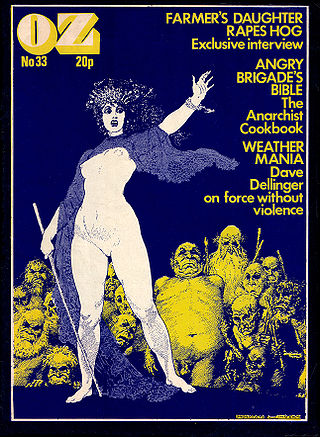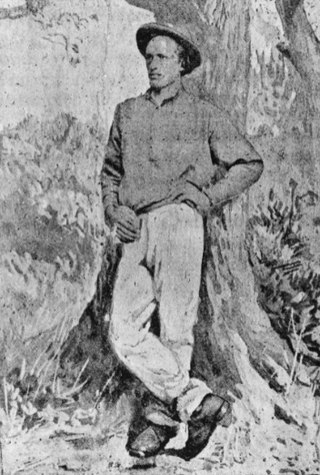Related Research Articles

Treason is the crime of attacking a state authority to which one owes allegiance. This typically includes acts such as participating in a war against one's native country, attempting to overthrow its government, spying on its military, its diplomats, or its secret services for a hostile and foreign power, or attempting to kill its head of state. A person who commits treason is known in law as a traitor.

The Industrial Workers of the World (IWW), nicknamed "Wobblies", is an international labor union founded in Chicago in 1905. The nickname's origin is uncertain. Its ideology combines general unionism with industrial unionism, as it is a general union, subdivided between the various industries which employ its members. The philosophy and tactics of the IWW are described as "revolutionary industrial unionism", with ties to socialist, syndicalist, and anarchist labor movements.
Sedition is overt conduct, such as speech and organization, that tends toward rebellion against the established order. Sedition often includes subversion of a constitution and incitement of discontent toward, or insurrection against, established authority. Sedition may include any commotion, though not aimed at direct and open violence against the laws. Seditious words in writing are seditious libel. A seditionist is one who engages in or promotes the interest of sedition.

Oz was an independently published, alternative/underground magazine associated with the international counterculture of the 1960s. While it was first published in Sydney in 1963, a parallel version of Oz was published in London from 1967. The Australian magazine was published until 1969 and the British version until 1973.
The Australian labour movement began in the early 19th century and since the late 19th century has included industrial and political wings. Trade unions in Australia may be organised on the basis of craft unionism, general unionism, or industrial unionism. Almost all unions in Australia are affiliated with the Australian Council of Trade Unions (ACTU), many of which have undergone a significant process of amalgamations, especially in the late 1980s and early 1990s. The leadership and membership of unions hold and have at other times held a wide range of political views, including communist, socialist and right-wing views.

Donald MacLennan Grant was a leader of the Industrial Workers of the World in Sydney, a member of the Sydney Twelve charged with conspiracy in 1916, and later a member of the Australian Labor Party who was elected to Sydney City Council, appointed to the New South Wales Legislative Council, and elected to the Australian Senate in 1943 where he served for sixteen years.

Elizabeth Gurley Flynn was an American labor leader, activist, and feminist who played a leading role in the Industrial Workers of the World (IWW). Flynn was a founding member of the American Civil Liberties Union and a visible proponent of women's rights, birth control, and women's suffrage. She joined the Communist Party USA in 1936 and late in life, in 1961, became its chairwoman. She died during a visit to the Soviet Union, where she was accorded a state funeral with processions in Red Square attended by over 25,000 people.
Leonard Arthur McPherson was one of the most notorious and powerful Australian career criminals of the late 20th century. McPherson is believed to have controlled most of Sydney's organised crime activity for several decades, alongside his contemporary Abe Saffron and associate, bookmaker George Freeman.
Australian sedition law was an area of the criminal law of Australia relating to the crime of sedition.
Ian Michael Macdonald is a former Australian politician and currently undergoing court proceedings and was a member of the New South Wales Legislative Council from 1988 to 2010 representing the Labor Party. Between 2003 and 2010, Macdonald held a range of ministerial responsibilities in the Carr, Iemma, Rees, and Keneally ministries. Macdonald, who joined the Labor Party in 1972, had his membership of the party terminated in 2013 for bringing the party into disrepute.

James Alpin MacPherson otherwise known as The Wild Scotchman, was a Scottish–born Australian bushranger active in Queensland and New South Wales in the 1860s. He was operational throughout the greater Wide Bay area and was eventually apprehended by members of the public outside the town of Gin Gin, Queensland.

Sir Philip Whistler Street, was the 8th Chief Justice of the Supreme Court of New South Wales and Lieutenant-Governor of New South Wales. He was the first member of the Street family to attain these viceregal offices, which were later held by his son Sir Kenneth Whistler Street and grandson Sir Laurence Whistler Street.

The New South Wales Crime Commission is a statutory corporation of the Government of New South Wales. It is constituted by the Crime Commission Act 2012, the object of which is to reduce the incidence of organised crime and other serious crime in the state of New South Wales, Australia.
Montague David "Monty" Miller, born 7 July 1839 in Van Diemen's Land, was an Australian trade unionist, secularist, and revolutionary anarchist-socialist chiefly active in the states of Victoria and, in his most productive period, in Western Australia. His activism with unions and the Industrial Workers of the World (IWW), during the early years of the twentieth century, saw him acting as a speaker and organiser for these sometimes illegal groups, leading to his conviction for conspiracy in 1916.
Seditious conspiracy is a crime in various jurisdictions of conspiring against the authority or legitimacy of the state. As a form of sedition, it has been described as a serious but lesser counterpart to treason, targeting activities that undermine the state without directly attacking it.

Tom Barker was a New Zealand tram conductor, trade unionist and socialist. He was born in Crosthwaite, Westmorland, England. He was a leading member of the Industrial Workers of the World (IWW) and politician in New Zealand and Australia.
The Health Services Union expenses affair was an Australian political scandal that concerned criminal activities associated with the financial affairs of the Health Services Union of Australia (HSU), between 2006 and 2007; and the Health Services Union "east branch" (HSUeast) between 2006 and 2011.
Criminal syndicalism has been defined as a doctrine of criminal acts for political, industrial, and social change. These criminal acts include advocation of crime, sabotage, violence, and other unlawful methods of terrorism. Criminal syndicalism laws were enacted to oppose economic radicalism.

The Industrial Workers of the World (South Africa) or IWW (SA) had a brief but notable history in the 1910s-20s, and is particularly noted for its influence on the syndicalist movement in southern Africa through its promotion of the IWW's principles of industrial unionism, solidarity, and direct action, as well as its role in the creation of organizations such as the Industrial Workers of Africa and the Industrial and Commercial Workers' Union.
References
- ↑ Crimes Act 1900 (NSW) Treason-Felony.
- 1 2 3 R v Reeve and others [1917] NSWStRp 9 , 17 SR (NSW) 81(1 March 1917), Court of Criminal Appeal (NSW).
- ↑ The appeal judgment spells his name Beatty. [2]
- 1 2 3 Head, Michael (2016). Crimes against the state: from treason to terrorism. Routledge. ISBN 9781317157922. OCLC 1062331708.
- ↑ People's History of Australia (9 April 2020). "People's History of Australia Podcast. Episode 9 – The Industrial Workers of the World in Australia". The Commons Social Change Library. Retrieved 1 March 2023.
- ↑ "Unlawful Associations Act 1916". To our last shilling. Parliamentary Education Office. Retrieved 2 November 2019.
- ↑ "I.W.W. treason charges". The Sydney Morning Herald . 11 October 1916. p. 12. Retrieved 2 November 2019– via National Library of Australia.
- ↑ "The Tottenham Tragedy: Roland Kennedy and Frank Franz, two Australian I.W.W. workers executed in 1916". takver.com. Retrieved 1 May 2005.
- ↑ "I.W.W. case: guilty of conspiracy". The Sydney Morning Herald . 2 December 1916. p. 13. Retrieved 2 November 2019– via National Library of Australia.
- ↑ "I.W.W. case. Heavy sentences imposed. Judge's remarks". The Sydney Morning Herald . 4 December 1916. p. 8. Retrieved 2 November 2019– via National Library of Australia.
- ↑ "Conviction of I.W.W. members". The Australian Worker . 7 December 1916. p. 2. Retrieved 2 November 2019– via National Library of Australia.
- ↑ "Fellow Worker Tom Barker". Industrial Workers of the World: A Union for All Workers.
- ↑ "Treason Case". The Telegraph . 11 October 1916. p. 7. Retrieved 2 November 2019– via National Library of Australia.
- ↑ "Royal Commission of Inquiry into the Matter of the Trial and Conviction and Sentences Imposed on Charles Reeve and Others". NSW State archives & records. 1920. Retrieved 2 November 2019.
{{cite web}}: CS1 maint: url-status (link) - ↑ "I.W.W. prisoners: text of the report". The Sydney Morning Herald . 31 July 1920. p. 13. Retrieved 2 November 2019– via National Library of Australia.
- ↑ "At last ... Charles Reeve released from jail". The Socialist . 2 December 1921. p. 1. Retrieved 2 November 2019– via National Library of Australia.
- ↑ Andy Irvine, Gladiators (lyrics) Archived 13 February 2005 at the Wayback Machine . Accessed 1 May 2005.